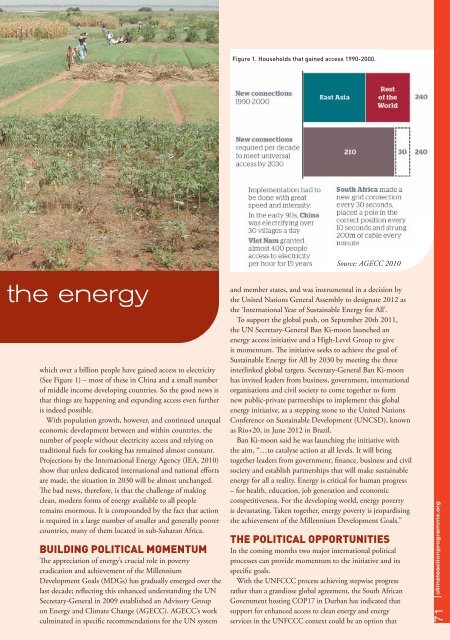Climate Action 2011-2012
You also want an ePaper? Increase the reach of your titles
YUMPU automatically turns print PDFs into web optimized ePapers that Google loves.
Figure 1. Households that gained access 1990-2000.<br />
the energy<br />
which over a billion people have gained access to electricity<br />
(See Figure 1) – most of these in China and a small number<br />
of middle income developing countries. So the good news is<br />
that things are happening and expanding access even further<br />
is indeed possible.<br />
With population growth, however, and continued unequal<br />
economic development between and within countries, the<br />
number of people without electricity access and relying on<br />
traditional fuels for cooking has remained almost constant.<br />
Projections by the International Energy Agency (IEA, 2010)<br />
show that unless dedicated international and national efforts<br />
are made, the situation in 2030 will be almost unchanged.<br />
The bad news, therefore, is that the challenge of making<br />
clean, modern forms of energy available to all people<br />
remains enormous. It is compounded by the fact that action<br />
is required in a large number of smaller and generally poorer<br />
countries, many of them located in sub-Saharan Africa.<br />
buildinG PolitiCal momentum<br />
The appreciation of energy’s crucial role in poverty<br />
eradication and achievement of the Millennium<br />
Development Goals (MDGs) has gradually emerged over the<br />
last decade; reflecting this enhanced understanding the UN<br />
Secretary-General in 2009 established an Advisory Group<br />
on Energy and <strong>Climate</strong> Change (AGECC). AGECC’s work<br />
culminated in specific recommendations for the UN system<br />
Source: AGECC 2010<br />
and member states, and was instrumental in a decision by<br />
the United Nations General Assembly to designate <strong>2012</strong> as<br />
the ‘International Year of Sustainable Energy for All’.<br />
To support the global push, on September 20th <strong>2011</strong>,<br />
the UN Secretary-General Ban Ki-moon launched an<br />
energy access initiative and a High-Level Group to give<br />
it momentum. The initiative seeks to achieve the goal of<br />
Sustainable Energy for All by 2030 by meeting the three<br />
interlinked global targets. Secretary-General Ban Ki-moon<br />
has invited leaders from business, government, international<br />
organisations and civil society to come together to form<br />
new public-private partnerships to implement this global<br />
energy initiative, as a stepping stone to the United Nations<br />
Conference on Sustainable Development (UNCSD), known<br />
as Rio+20, in June <strong>2012</strong> in Brazil.<br />
Ban Ki-moon said he was launching the initiative with<br />
the aim, “…to catalyse action at all levels. It will bring<br />
together leaders from government, finance, business and civil<br />
society and establish partnerships that will make sustainable<br />
energy for all a reality. Energy is critical for human progress<br />
– for health, education, job generation and economic<br />
competitiveness. For the developing world, energy poverty<br />
is devastating. Taken together, energy poverty is jeopardising<br />
the achievement of the Millennium Development Goals.”<br />
the PolitiCal oPPortunities<br />
In the coming months two major international political<br />
processes can provide momentum to the initiative and its<br />
specific goals.<br />
With the UNFCCC process achieving stepwise progress<br />
rather than a grandiose global agreement, the South African<br />
Government hosting COP17 in Durban has indicated that<br />
support for enhanced access to clean energy and energy<br />
services in the UNFCCC context could be an option that<br />
71 climateactionprogramme.org












